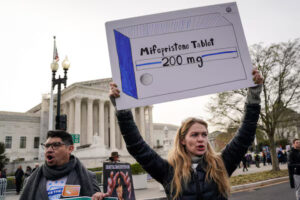Former South Carolina Gov. Nikki Haley suspended her presidential campaign in March, but she continues to make a significant impact in the Republican primaries, garnering a notable share of votes against Donald Trump, which experts see as a potential warning sign for the former president.
On Tuesday, Haley received 20% of the vote in Maryland, 17.9% in Nebraska, and 9.4% in West Virginia. In the Indiana primary last week, Haley secured 21.7% of the vote. While Trump won these states decisively—receiving 80.2% in Nebraska, 80% in Maryland, 88.4% in West Virginia, and 78.3% in Indiana—Haley’s substantial support indicates that Trump, the presumptive GOP nominee, might still face notable opposition within his own party.
Haley managed to build a broad coalition of voters, including moderate and anti-Trump Republicans, during her presidential run, which has cut into Trump’s commanding lead in the primary polls. Political scientists and strategists suggest that as Haley’s “zombie campaign” continues to draw support, Trump could be at risk if he fails to engage this dissatisfied segment of the GOP base, which could reject him in the general election. This is particularly crucial in a contest where swing states might be decided by narrow margins.
“Haley continuing to garner support after suspending her campaign may indicate that a significant number of normally loyal Republicans are not supportive of Trump,” said Grant Reeher, a political science professor at Syracuse University. He noted that while it’s unclear if these voters will choose Biden or another candidate in the general election, they might abstain from voting altogether, which could hurt Trump, especially in battleground states.
How much danger is Trump in?
Numerous polls indicate that Trump is leading Biden in key battleground states. A recent New York Times/Siena College/The Philadelphia Inquirer poll, conducted from April 28 to May 9, found Biden trailing Trump by seven points in Arizona, 10 points in Georgia, seven points in Michigan, 12 points in Nevada, and three points in Pennsylvania. Wisconsin was the only state where Biden led Trump by two points.
Securing support from Haley voters could help Biden close the gap in the general election, particularly in metro and suburban areas where Haley’s vote share has been strong, according to Wesley Leckrone, a political science expert at Widener University. For example, Haley received 25% of the vote in Chester County, Pennsylvania, and 23% in Cobb County, Georgia, both of which Biden won in 2020.
“I think much of the discontent among anti-Trump Republicans is more about his style of politics and personality. Views on Trump are pretty hardened at this point, and he continues to use the same campaign style,” Leckrone said. “It’s unlikely that will change in the coming months. Perhaps his choice of a vice president candidate could help bring moderates back into the fold, but it’s unlikely.”
Republican strategist Ford O’Connell, who served as a Trump White House and campaign surrogate for the 2020 election, believes Trump’s main focus should be ensuring high turnout among irregular and infrequent voters who favor him in battleground states rather than appealing to Haley voters. “The most effective way to use your time and resources is to focus on a ballot turnout operation in the six states that will determine this election: Arizona, Georgia, Nevada, Michigan, Wisconsin, and Pennsylvania,” he stated.
Can Biden win over these Haley voters?
Whether Haley voters will choose Biden in the general election or a third-party candidate remains uncertain. Biden has lost support from key groups, including young voters, Black voters, and Hispanic voters, due to his handling of the Israel-Hamas conflict and economic issues.
The New York Times/Siena poll found that over 50% of respondents in Arizona, Georgia, Michigan, Nevada, and Pennsylvania rate current economic conditions as poor. Additionally, only 28% of respondents aged 18 to 29 trust Biden to handle the broader Israel-Palestinian conflict, compared to 52% who trust Trump.
Aaron Kall, a political expert at the University of Michigan, emphasized that Biden must prioritize winning over Haley’s supporters in his general election strategy. “A ceasefire in the Middle East or a drop in inflation leading to lower interest rates from the Fed could really sway these voters towards Biden,” Kall explained. “It’s encouraging that these voters are still in play and appear unlikely to back Trump.”






Be First to Comment